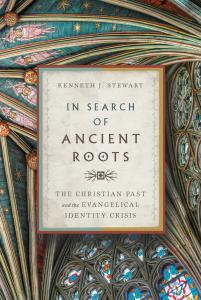There aren’t really very many Evangelicals leaving the faith for Roman Catholicism or Eastern Orthodoxy, but it is still a trend that has seen a slight upswing in the past few years. Now, to be fair, that slight upswing is really nothing compared to the flood of Roman Catholics converting to Evangelical Christianity. (The numbers in the linked article are from the United States, and admittedly aren’t exactly a ‘flood;’ yet when when we add worldwide conversions to that list it really does constitute a flood. For example, this.) But, at least some of those Evangelical to Catholic conversions are high profile enough that Kenneth Stewart has written a response in the recent book In Search of Ancient Roots: The Christian Past and the Evangelical Identity Crisis.

This isn’t the kind of book that I thought it would be (which just shows you that I didn’t read the back cover before diving in). I had expected an apologetic for why Protestantism is true and Roman Catholicism (and to a lesser extent, Eastern Orthodoxy) are heretical. And to be sure there’s some of that (especially in the last three chapters). But by and large this book is a response to the reasons prominent Evangelicals have apostasized combined with some historical reasons why such apostasy is unnecessary.
And that is really a big point–there is a deficiency in contemporary Evangelicalism. This is not a deficiency in doctrine (in some ways our doctrine has been improving in the last half century). It is rather a deficiency in our practice and historical awareness. Specifically, Stewart spends much of the book pointing out that the modern Evangelical ignorance of our own history leads us to assume that anyone who knows even a modicum of history (i.e. Roman Catholicism and Eastern Orthodoxy) must have a more historically solid foundation. The problem of course is that both Roman Catholicism and Eastern Orthodoxy are, in their modern versions, no more ‘historical’ than Evangelicalism–though some of their adherents are slightly more familiar with their own histories than most Evangelicals.* This lack of historical awareness, the result of the anti-intellectualism and the “Bible-only” anti-creedal movements of the 19th and early 20th centuries, has certainly resulted in an Evangelical world today that
- Far too easily gets caught up in the political or millennarian movement of the moment (how else do we explain the contemporary Christian right and Christian left? or all those books with terrible eschatology that sell so well);
- Has a shallow, and occasionally silly, worship service that is far too focused on the trend of today rather than on the hard-won practices of the past. Seriously, our Protestant forbears risked their lives so that we participate in both elements of communion, and modern Evangelicals turn around and take communion online. Or using clowns.
As a result, it’s really no wonder that some Evangelicals look at the baubles of Rome that do genuinely predate our WWJD bracelets (some Roman Catholic practices do even go back to the Middle Ages–but not many) and say “there is historical depth, I want in on that.” Stewart points out that the problems with modern Evangelicalism do not establish the validity of Rome’s claim, nor have they been persistent in our history. He spends multiple chapters tracing the past strengths of Evangelical historical awareness and traditional practices, as well as the development of Catholic doctrine in its present form. These discussions are useful and interesting, and hopefully will serve a good purpose in encouraging Evangelicals to dig into our own tradition, rather than crossing the Tiber into heresy.
The primary limitation of this book is that it is a bit scattered in its presentation. I suspect this is because (as Stewart points out) the reasons people have for converting to Roman Catholicism are varied. Any Evangelical response is of necessity going to be wide-ranging and a bit confused. Still, I think a better structure would have helped this book significantly.
One thing that Stewart doesn’t get into: what would it take for reconciliation with Rome? Obviously I don’t mean in a political or social sense–we should be quite happy to work with Roman Catholics (and the Eastern Orthodox) when it comes to pro-life issues, or traditional marriage, or other social problems that require political involvement. But those are all, as C.S. Lewis would have said, ‘second things.’ What about matters of first importance? What would it take for true Christian fellowship between Evangelicals and Roman Catholics (the EO are in a different category, and would require a separate blog post). Well, I think there are three things that need to happen on their end. In order to establish the kind of fellowship that I (as a Baptist) experience with, say, my Presbyterian or Lutheran brothers, our Roman Catholic friends would have to
- Embrace the Biblical doctrine of justification by faith alone.
- Reject the doctrine of papal infallibility.
- Reject the doctrine of transubstantiation.
Until these things are done, there’s no hope of reconciliation with Rome–and Evangelicals who cross the Tiber ought to be treated as apostate. (i.e. We ought to patiently and kindly share the Gospel with them, like we do with everyone else.) Which means that practically we ought to continue to pray for the salvation of our Roman Catholic friends, and for the reform of their institutions.
*But only slightly more. When I was a grad student at The Catholic University of America, I can’t begin to tell you how many people told me that if only I knew the history of Christianity, I’d see that Catholicism was really true. So I decided that was a good point and sunk myself into an informal but intensive study of church history (including taking some CUA classes on the subject). After a few years of this, I’d find myself going into discussions about Catholicism where the Roman Catholic would say ‘you know the church has always done X’, and I’d reply ‘well, actually, in the Middle Ages that was hotly disputed and never settled, but here are the key sides.’ To which said Roman Catholic would reply ‘well, I don’t actually know much about that.’ So it’s not just Evangelicals who are ignorant of their own history.
I was given a free copy of this book for the purposes of review. I was not required to write a positive one.
Dr. Coyle Neal is co-host of the City of Man Podcast and an Assistant Professor of Political Science at Southwest Baptist University in Bolivar, MO, where he lives on the correct side of the Tiber.













